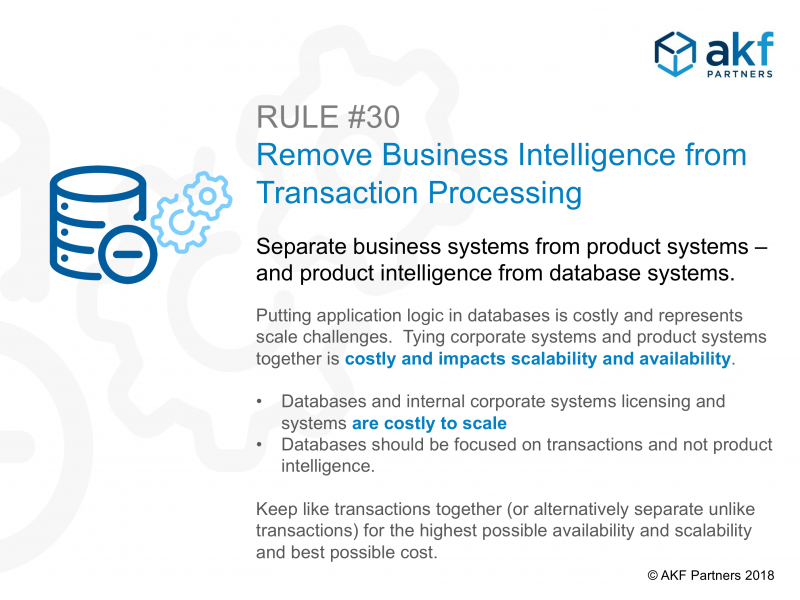In my short tenure at AKF, I have found the topic of Stored Procedures (SPROCs) to be provocatively polarizing. As we conduct a technical due diligence with a fairly new upstart for an investment firm and ask if they use stored procedures on their database, we often get a puzzled look as though we just accused them of dating their sister and their answer is a resounding “NO!”
However, when conducting assessments of companies that have been around awhile and are struggling to quickly scale, move to a SaaS model, and/or migrate from hosted servers to the cloud, we find “server huggers” who love to keep their stored procedures on their database.
At two different clients earlier this year, we found companies who have thousands of stored procedures in their database. What was once seen as a time-saving efficiency is now one of several major obstacles to SaaS and cloud migration.

In our book, Scalability Rules: Principles for Scaling Web Sites, (Abbott, Martin L.. Scalability Rules: Principles for Scaling Web Sites) Marty outlines many reasons why stored procedures should not be kept in the database, here are the top 8:
- Cost: Databases tend to be one of the most expensive systems or services within the system architecture. Each transaction cost increases with each additional SPROC. Increase cost of scale by making a synchronous call to the ERP system for each transaction – while also reducing the availability of the product platform by adding yet another system in series – doesn’t make good business sense.
- Creates a Monolith: SPROCs on a database create a monolithic system which cannot be easily scaled.
- Limits Scalability: The database is a governor of scale, SPROCS steal capacity by running other than relational transactions on the database.
- Limits Automated Testing: SPROCs limit the automation of code testing (in many cases it is not as easy to test stored procedures as it is the other code that developers write), slowing time to market and increasing cost while decreasing quality.
- Creates Lockin: Changing to an open-source or a NoSQL solution requires the need to develop a plan to migrate SPROCs or replace the logic in the application. It also makes it more difficult to switch to new and compelling technologies, negotiate better pricing, etc.
- Adds Unneeded Complexity to Shard Databases: Using SPROCs and business logic on the database makes sharding and replacement of the underlying database much more challenging.
- Limits Speed To The Weakest Link: Systems should scale independently relative to individual needs. When business logic is tied to the database, each of them needs to scale at the same rate as the system making requests of them - which means growth is tied to the slowest system.
- More Team Composition Flexibility: By separating product and business intelligence in your platform, you can also separate the teams that build and support those systems. If a product team is required to understand how their changes impact all related business intelligence systems, it will slow down their pace of innovation as it significantly broadens the scope when implementing and testing product changes and enhancements.
Per the AKF Scale Cube, we desire to separate dissimilar services - having stored procedures on the database means it cannot be split easily.
Need help migrating from hosted hardware to the cloud or migrating your installed software to a SaaS solution? We have helped hundreds of companies from small startups to well-established Fortune 50 companies better architect, scale, and deliver their products. We offer a host of services from technical due diligences, onsite workshops, and provide mentoring and interim staffing for your company.